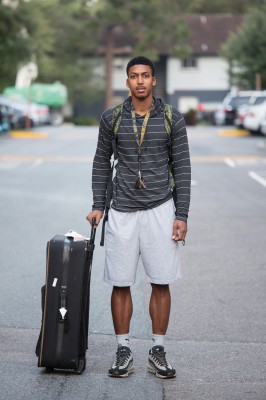In early 2014, Clarke spent a few weeks with family in Cincinnati, Ohio and sought to return to his home in Orlando, Florida where he is a student at the University of Central Florida. As he traveled through Cincinnati/Northern Kentucky International Airport in Hebron, Ky., a ticketing agent with U.S. Airways called the DEA and the Cincinnati/Northern Kentucky Airport Police Department, telling them that Clarke’s luggage ‘smelled like marijuana’.
No drugs were found on Clarke, but the ‘smell’ was all law enforcement needed to seize Clarke’s money, cellphone and iPad. The latter 2 were returned to Clarke, but a year later he is still fighting to get his life savings back.
Court documents show that the money was seized “based on probable cause that it was proceeds of drug trafficking or was intended to be used in an illegal transaction.”
“The burden should not be on Charles to prove that his money is legitimate,” the Institute said in a press release. “In order to keep his money, the government should have to prove that Charles committed a crime.”
It Gets Worse
The most outrageous aspect of Clarke’s case is that 13 different law enforcement agencies in two states want a cut of his money, even though 11 of them weren’t involved. It’s part of a program called equitable sharing. In one of his last acts as US attorney general in March, Eric Holder announced a policy that severely limits equitable sharing, although the action didn’t end it.
Source: offthegridnews.com
You may ask, “How can this be true? It doesn’t sound legal!”
Well, it is all legal under something called civil asset forfeiture, which permits law enforcement to simply take your money or property if it’s suspected of being part of a crime. That is, suspected, no actual proof is necessary.
In many cases, though, the property owner is never charged with a crime, and those who fight to have their cash and property returned are forced to prove that their belongings are innocent. The practice, policy experts argue, flips the presumption of innocence—innocent until proven guilty—on its head.
In Clarke’s case, the money was seized under the Department of Justice’s Equitable Sharing Program, which entitles local and state law enforcement agencies to up to 80 percent of the proceeds from seized cash and property.
From 2008 to 2013, according to the Arlington, Va.,-based Institute for Justice, $6.8 billion in cash and property has been seized through the Equitable Sharing Program.
Though just two agencies—the Drug Enforcement Agency and Cincinnati/Northern Kentucky Airport Police—were involved in the seizure of Clarke’s $11,000, 11 agencies across Kentucky and Ohio are arguing they’re entitled to a cut of the cash.
That’s according to Renee Flaherty, one of Clarke’s lawyers at the Institute for Justice, who spoke with The Daily Signal.
The airport police department is requesting 40 percent of the money and the Cincinnati Police Department wants just 6 percent, with the remaining 11 agencies requesting 3 percent of Clarke’s $11,000 each.
“Every little bit adds up,” Flaherty said regarding the money the agencies are requesting. “This just goes to show the perverse financial incentive that underlies civil forfeiture. If the law allows agencies to be able to keep the money they seized themselves, it’s going to incentivize law enforcement to seize as much property as possible.”
Source: dailysignal.com
EXCELLENT video on this travesty:


Next time carry traveler’s checks.
You know what’s sad, there’s still a lot of Ediths out there..scary..
10, 000.00. Know the rules. Everyone these days seem to have an excuse or a reason why “they” are special and don’t have to obey the law.
This is a non-issue.
Should have never made the news. UNLESS HE WAS GONNA GIVE IT TO TERRORISM GROUPS.
Agreed. I don’t feel sorry at all.
Wss probably gonna give it to terrorists.
Yep. Non issue. Prob gonma give it to ISIS.
No. Just can’t leace with more than 10 grand. Thats been the law for a long time.
Non issue. He should serve jail time as well. Follow the law.
Been going on for years.
He was probably taking it to the IRS.
I never knew that there was a law about how much cash a person can carry. Just another way to control the people and rob the people.